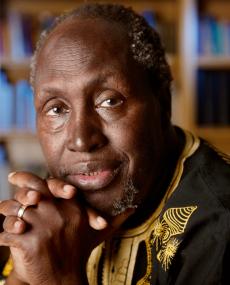
The academic and social activist, Ngugi wa Thiong’o is one of the greatest writers of the 20th century. He was born James wa Thiong’o Ngugi in Limuru, Kenya on 5 January 1938 during the height of British colonialism. He attended Kamandura, Manguu and Kinyogori primary schools before proceeding to Alliance High School. During his education the background was the Mau Mau war of independence between 1952 and 1963. He obtained a Bachelor of Arts degree from Makerere University in 1963, the same year that Kenya became independent from Britain. The following year he got another Bachelor of Arts degree at the University of Leeds in Britain.
wa Thiong’o wrote the play, The Black Hermit whilst still an undergraduate at Makerere. It was performed at Kampala National Theatre during the country’s independence celebrations in 1962. wa Thiong’o published his first novel, Weep Not, Child in 1964 and the second, The River Between the following year.
In 1967 he worked as a lecturer in the Department of English at the University of Nairobi and published A Grain of Wheat in July the same year. Subsequently, he became a senior lecturer and the chair of the literature department. This led to him being instrumental in a movement that saw the changing of the same department into the Department of Literature, which advantaged African literature. He discarded his English name, James, in favour of Ngugi during this time.
In 1976 wa Thiong’o co-authored the play, The Trial of Dedan Kimathi with a colleague, Micere Githae Mugo. The British settler establishment killed the revolutionary Kimathi in 1957 for being on the forefront of the Mau Mau uprisings. The play was performed in an open-air theatre and ruffled feathers within the country’s political leadership. The following year wa Thiong’o published another novel, Petals of Blood, which portrayed the state of the country post-colonialism. The same year his play, Ngaahika Ndena (I Will Marry When I Want) proved too challenging to the authorities and was consequently banned. He was subjected to an onslaught of political persecutions. His collection of books was confiscated and he spent the rest of 1978 in detention without trial at Kamiti Maximum Prison. wa Thiong’o chose to write in the Kikuyu language around this period. He lost his job at the university and upon release from prison he struggled to get any employment in the country. In 1982 he went to Britain to promote the novel that he wrote while in prison, Caitani Mutharabaine, which was later translated into English as Devil on the Cross. Owing to political challenges at home wa Thiong’o decided to live in exile. He lived in Britain between 1982 and 1989.
In 1983 he wrote Barrel of a Pen: Resistance to Repression in Neo-Colonial Kenya and three years later wrote against Neocolonialism and the seminal Decolonising the Mind: the Politics of Language in African Literature, which is regarded as one of the primary sources of post-colonial studies. In the late 1980s wa Thiong’o started writing in English again, to help his academic career. Between 1992 and 2002 he was the professor of Comparative Literature and Performance Studies at New York University.
He pens plays, novels, short stories, critical essays and children’s books. Generally wa Thiong’o writings deal with the cultural and political legacy of colonialism in contemporary Africa. He is often invited to deliver public lectures to top universities across the globe. After several attempts at his life, the literary genius returned to Kenya in 2004, two years after President Daniel Arap Moi’s autocratic political party lost power. Since 1965 he has amassed a number of literary awards, honorary doctorates as well as professorships from across the world. Currently he is a Professor of English and Comparative Literature at the University of California in Irvine.